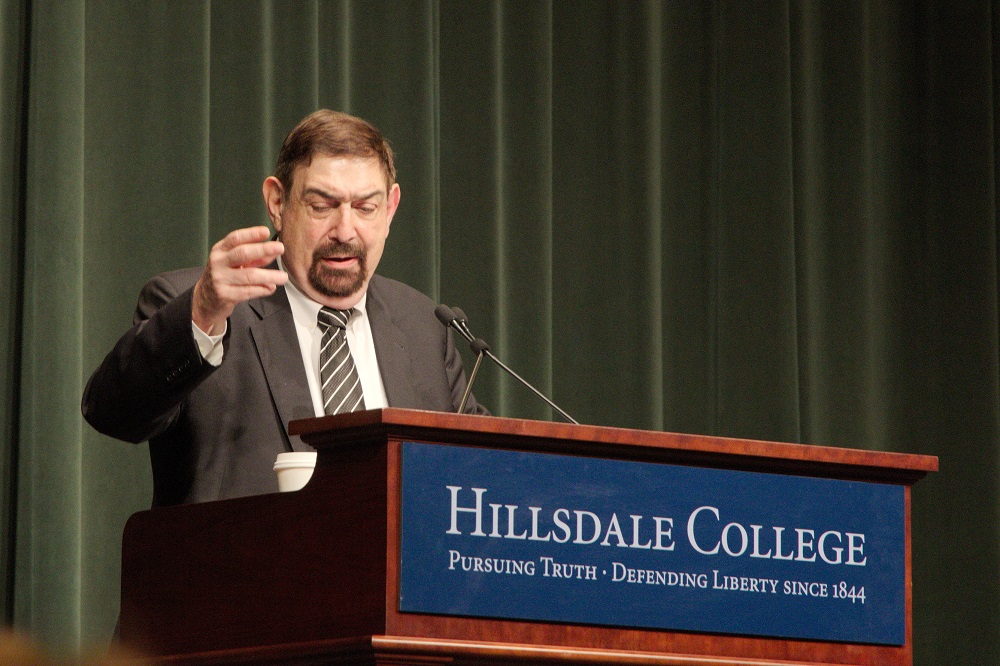
Patrick Caddell is an American public opinion pollster and former political film consultant in the Jimmy Carter White House. A regular Fox News contributor, Caddell has served as a consultant to various movies and television shows, including the serial drama “The West Wing.” Caddell spoke Monday in Phillips Auditorium on “The Democrat Party Today,” as part of the Center for Constructive Alternatives seminar on Democrats and Republicans.
How did you get started in polling and political consulting?
In high school, I had to do a math project, and I had just gained an interest in politics the year before. That year, the news networks called the governor’s race for the first time, using precinct polling. Around 7:30 p.m., they called the Florida governor’s race against my candidate, the Democrat, and I was stunned and fascinated because they were right.
I decided I would build a model to do the same thing for a bunch of local elections. This was 1967, and as a junior in high school, I was able to do exit polling for the elections in Jacksonville, Florida. My dad helped get my results called out at the Democrats’ election night watch party in the county court house. The races that election were very close, and I was right on all of them, which was insane. I just called them, not knowing it was within the margin of error, but I turned out to be right. It turned out to be a big deal at the election party, and the local newspaper did a piece on me, calling me “Mr. Prediction.” Then this fellow, Brad Shultz, who eventually became speaker of the Florida House, hired me to do polling analysis for him. So, to do the analysis, I hired my classmates, and we covered most of the local elections in Florida. Our analysis was always right, and everyone couldn’t believe it. Around this time, The Washington Post had affiliates in Miami and Jacksonville, and I would help them call the races on election nights. From there, I officially started my polling and consulting business.
You crafted a strategy to help Jimmy Carter win the presidency and were called the “best pollster in the business.” What advice do you have for those considering political consulting?
While I was a college student at Harvard in the Institute of Politics, my business did well in Florida, which later gave me jobs in Ohio. This led to a job in the George McGovern presidential campaign in 1972, when I was only 21. This was the beginning of my national staging, and, even though we lost 49 states, it turned out pretty well for me because it later got me a job with the Jimmy Carter campaign. I was part of a small group advising Jimmy Carter that convinced him of using a restoring-trust message to unify the nation. Many years later I told him, “I finally figured it out, Mr. President. You had all us young guys helping you because we were the only ones young enough and dumb enough to believe you could be elected president,” and he laughed. So that’s it really. I had some talent and a few ideas, and I was in politics because I believed in it, unlike today, where it has become awfully mercenary.
My advice is ‘if you are interested in it, find something you are interested in doing, and do it well.’ The ironic thing about politics is it is a meritocracy. People can advance very quickly by proving their ability. There are very few real experts.
Your political commentary and advice differ with mainstream Democrats on things like environmentalism and health care. When trying to persuade fellow Democrats, what have you found to be most successful?
I remind them that I am a Democrat by heritage, and I have my credentials in the Democratic Party and the civil rights movement, where I came out politically strong. My opinions differ with them because I have refused to abandon my principles, and I have refused to use their talking points. I made a promise to myself that I would never say anything that I did not believe. A lot of Democrats get angry and want me to be more in line with my party.
My main argument with them is when you subordinate your principles to what party bosses tell you, you become a political hack.
Unfortunately, I believe we have lost a sense of personal integrity in both parties. This is why the country is rebelling against the parties because everything is politicized for the benefit to the people in power and not for the people of the country. The Democrats have lost their sense of conscience and have become an identity-victimization party and have stopped standing for things like it once did. The only thing you can do is remind them of who they once were and why it’s important to return to that.

